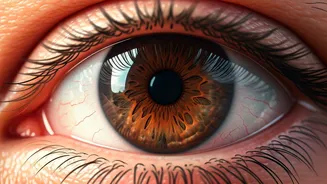Eyes and Heart Health
Routine eye examinations are more than just a check of your vision; they can provide early warnings of heart disease. Doctors have discovered that examining
the blood vessels in the eyes can help in detecting potential cardiovascular problems. The retina, in particular, offers a unique window into your overall health, allowing medical professionals to observe the state of blood vessels directly. Changes in these vessels, such as narrowing or blockages, can signal similar issues in the heart. This early detection enables timely interventions, potentially preventing serious cardiac events. Regular eye check-ups are thus a proactive step in maintaining heart health. They offer a non-invasive method for identifying early signs of heart conditions before symptoms become severe.
Foods for Heart Health
Certain foods have properties that can significantly benefit the health of your heart and blood vessels. These foods help reduce blockages and aid in vessel repair. Incorporating these into your diet can lead to a healthier cardiovascular system. While a complete list of these foods is extensive, some of the most beneficial include those rich in omega-3 fatty acids, such as salmon and flaxseeds. These nutrients are known for their anti-inflammatory properties, which help reduce the risk of plaque buildup in the arteries. Foods high in antioxidants, like berries and green leafy vegetables, also play a crucial role. These antioxidants help protect blood vessels from damage and promote overall heart health. Remember, diet is a powerful tool in preventing heart disease and maintaining cardiovascular well-being.
Delhi's Air Quality Impact
The air quality in Delhi, particularly after events like Diwali, has a significant impact on public health, especially regarding cardiovascular well-being. Deteriorating air quality can lead to a 'Severe' level, which poses serious health risks, particularly for individuals with pre-existing heart conditions. The fine particulate matter present in polluted air can irritate the lungs and increase the risk of heart attacks and strokes. Residents and travellers need to take precautions to minimize exposure to polluted air. These precautions include wearing high-quality masks, avoiding outdoor activities during peak pollution times, and staying informed about air quality updates. The air quality challenges faced in Delhi highlight the importance of understanding environmental factors and their impact on heart health and taking proactive measures to protect yourself.
Precautions to Take
Given the 'Severe' air quality in Delhi, taking specific precautions is crucial for safeguarding cardiovascular health. Residents and travelers should prioritize staying informed about pollution levels. Regularly checking air quality indices can help them plan their activities accordingly. Wearing N95 or higher-rated masks during outdoor activities is highly recommended to filter out harmful particulate matter. Limiting outdoor exposure, especially during peak pollution hours, is another vital step. People should also consider using air purifiers indoors to improve air quality within their homes and offices. In addition, those with existing heart conditions should consult with their healthcare providers. They should develop personalized strategies for managing the risks associated with poor air quality. These measures collectively contribute to mitigating the adverse effects of air pollution and protecting heart health.














